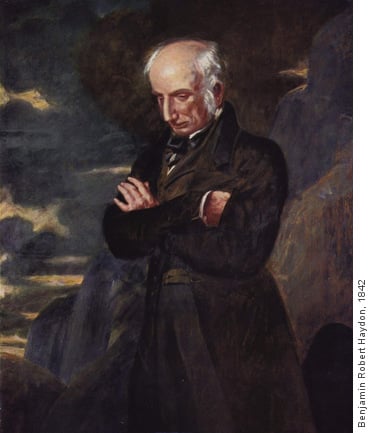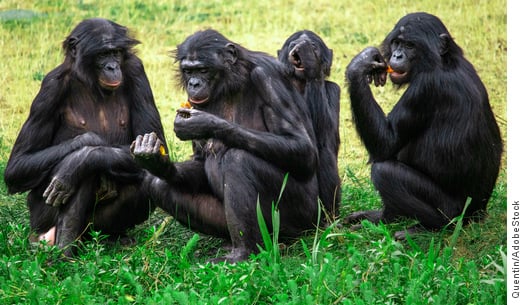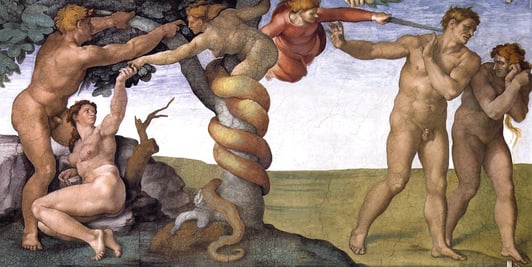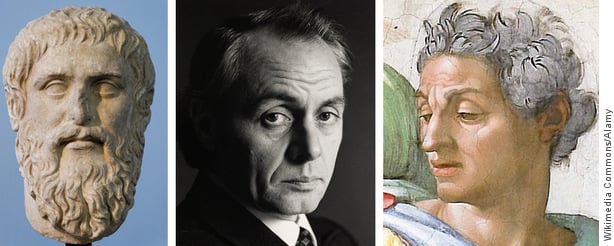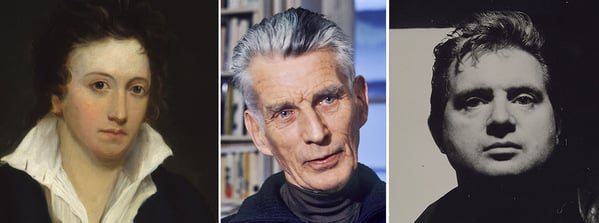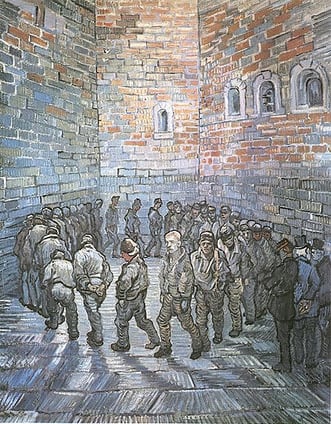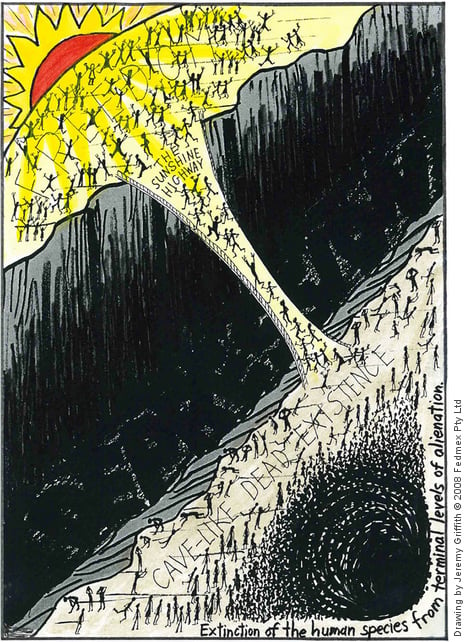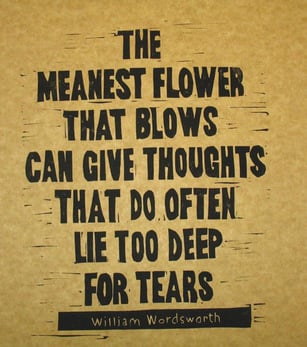Wordsworth's Fabulous Poem
“That assemblage of words in Wordsworth’s great poem — ‘But trailing clouds of glory do we come’ — must surely be about the most beautiful description of any subject ever written, so it’s fitting that the subject the description has been reserved for also happens to be the most beautiful of subjects, namely that child within us, our species’ Garden-of-Eden-nurseried, heavenly, cooperatively-nurtured-and-orientated, original, instinctive self or soul.” Jeremy Griffith
Please note, links to all the Freedom Essays are included at the end of this essay. Open any essay to read, print, download, share or listen to (as an audio).
Freedom Essay 31
Wordsworth’s great honesty that
“trailing clouds of glory do we come”
Written by Jeremy Griffith, 2017
The whole point of the presentation I gave at the launch of my book FREEDOM: The End Of The Human Condition at the Royal Geographical Society (RGS) in London in 2016—the transcript of which forms Parts 1 and 2 of the booklet Transform Your Life And Save The World—was to make it clear how astronomically guilt-ridden the human race has to be after we became conscious and the resulting upset anger, egocentricity and alienation in us destroyed the paradise of our species’ original instinctive cooperative and loving soul’s world. From an all-loving, all-sensitive and completely happy innocent life, we then—for a reason we had absolutely no understanding of—turned into ferociously selfish, competitive and aggressive monsters! NO WONDER we chose to shamefully hide in Plato’s metaphorical cave of darkness away from any light that would reveal our horrifically corrupted condition! (Freedom Essay 20 explains the genius of Jeremy’s RGS presentation.)
As described in chapter 2:6 of FREEDOM, the ancient Greek philosopher Plato was absolutely right when he wrote that we were so ashamed of ‘our human condition’ that we would ‘often unduly discredit’ the truth of our species’ ‘blessed’ past—indeed of any truth that brought the ‘painful’ issue of ‘the imperfections of human life’ into focus. This, he continued, left us hiding ‘a long way underground’, ‘enshrined in that living tomb which we carry about, now that we are imprisoned’ in a ‘cave’-like state of dishonest denial where there was ‘more and more forgetting [alienation]’, to the point where we could only ‘see dimly and appear to be almost blind’—a development that Plato predicted would eventually lead to a state of terminal alienation and ‘universal ruin to the world’! (Video/F. Essay 11 provides analysis of Plato’s cave allegory, while The Great Guilt that causes the Deaf Effect explains the extent of our shame for having destroyed our instinctive loving self or soul; and F. Essay 55 describes the endgame for the human race that Plato predicted.)
So ‘forgetting‘ and ‘blind[ing]’ denial has been super precious for the human race—but it also meant that we faced the prospect of becoming so alienated that ‘universal ruin’ of our ‘world’ would occur, which does mean that any truth would also be super precious. There had to be some truth to counter all the denial/darkness/black-out—and that’s precisely what great literature, art, poetry and songs have provided; they allowed the light of some honesty about our corrupted human condition to escape from that dark ‘tomb’ in which we have been hiding.
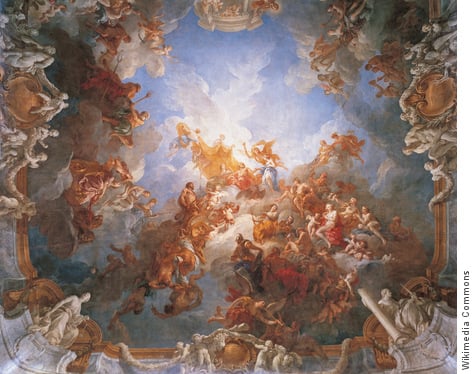
The fabulous celestial light of truth in our world of darkness
(Francois Lemoyne’s The Apotheosis of Hercules, c.1736)
F. Essay 45 about prophetic songs documents such instances in music of truth escaping that darkness. Well, in the realm of poetry there surely cannot be a more amazing and wonderful and majestic bursting out of truth about our species’ original ‘blessed’ state of innocence and the present state of extreme ‘imperfections of human life’ than in the great English poet laureate William Wordsworth’s 1807 poem Intimations of Immortality from Recollections of Early Childhood.
And now that the human condition has been explained and our upset state defended (see THE Interview and Video/F. Essay 3), full acknowledgement of our species’ past state of innocence (see F. Essay 21) and present corrupted condition can, and indeed must, be acknowledged if we are to free ourselves from living in Plato’s awful, soul-dead cave of darkness—which makes all the truth about our past innocence and present corrupted condition in Wordsworth’s great poem even more precious!
This is Wordsworth’s description — surely one of, if not the most, beautiful ever written — of our species’ fabulous past state of innocent cooperation, love and togetherness, and of our subsequent unspeakably tragic departure from that state, in his poem Intimations of Immortality from Recollections of Early Childhood:
‘There was a time when meadow, grove, and streams / The earth, and every common sight / To me did seem / Apparelled in celestial light / The glory and the freshness of a dream / It is not now as it hath been of yore / Turn wheresoe’er I may / By night or day / The things which I have seen I now can see no more // The Rainbow comes and goes / And lovely is the Rose / The Moon doth with delight / Look round her when the heavens are bare / Waters on a starry night / Are beautiful and fair / The sunshine is a glorious birth / But yet I know, where’er I go / That there hath past away a glory from the earth.’
Wordsworth went on to describe how nature and the innocence of youth helped resuscitate his soul by reminding him of this lost paradise that the human race once lived in, writing that, while ‘To me alone there came a thought of grief / A timely utterance gave that thought relief / And I again am strong / The cataracts blow their trumpets from the steep / No more shall grief of mine the season wrong / I hear the Echoes through the mountains throng / The Winds come to me from the fields of sleep / And all the earth is gay … / Thou Child of Joy / Shout round me, let me hear thy shouts, thou happy Shepherd-boy! // Ye blessed Creatures, I have heard the call / Ye to each other make; I see / The heavens laugh with you in your jubilee / …While Earth herself is adorning / This sweet May-morning / And the Children are culling [calling] / On every side / In a thousand valleys far and wide.’
However, he was then, again, thrown back into depression by being reminded of his own loss of innocence, and of the alienation from our species’ innocent soul in humans everywhere: ‘But there’s a Tree, of many, one / A single Field which I have looked upon / Both of them speak of something that is gone / The Pansy at my feet / Doth the same tale repeat / Whither is fled the visionary gleam? / Where is it now, the glory and the dream? // Our birth is but a sleep and a forgetting / The Soul [which, again, is the instinctive memory of our species’ past all-loving, selfless and cooperative existence, the origin of which is explained in F. Essay 21] that rises with us [that we are born with], our life’s Star / Hath had elsewhere its setting / And cometh from afar / Not in entire forgetfulness / And not in utter nakedness / But trailing clouds of glory do we come / From God [the integrative state – see F. Essay 23], who is our home / Heaven lies about us in our infancy! / Shades of the prison-house begin to close / Upon the growing Boy / …And by the vision splendid / Is on his way attended / At length the Man perceives it die away / And fade into the light of common day / …Forget the glories he hath known / And that imperial palace whence he came.’
While Wordsworth’s description of our species’ time in innocence is sublime, other great thinkers and writers have managed to give powerful accounts
of it:
Plato also wrote of ‘a time when…we beheld the beatific vision and were initiated into a mystery which may be truly called most blessed [the fully integrated state], celebrated by us in our state of innocence, before we had any experience of evils to come, when we were admitted to the sight of apparitions innocent and simple and calm and happy, which we beheld shining in pure light, pure ourselves and not yet enshrined in that living tomb which we carry about, now that we are imprisoned’, and when we lived a ‘blessed and spontaneous life…[where] neither was there any violence, or devouring of one another, or war or quarrel among them…And they dwelt naked, and mostly in the open air…and they had no beds, but lay on soft couches of grass’. (see pars 158 & 170 of FREEDOM)
Some 400 years before Plato, his Greek compatriot Hesiod also gave this description of the lives of our distant innocent, cooperative and loving bonobo-like (see F. Essay 21) ancestors: ‘When gods alike and mortals rose to birth / A golden race the immortals formed on earth…Like gods they lived, with calm untroubled mind / Free from the toils and anguish of our kind / Nor e’er decrepit age misshaped their frame…Strangers to ill, their lives in feasts flowed by…Dying they sank in sleep, nor seemed to die / Theirs was each good; the life-sustaining soil / Yielded its copious fruits, unbribed by toil / They with abundant goods ’midst quiet lands / All willing shared the gathering of their hands’. (see par. 180 of FREEDOM)
The matriarchal, nurturing, gentle, relaxed, peaceful, cooperative and loving bonobos as
‘they dwelt naked, and mostly in the open air…and…lay on soft couches of grass’. Just how
perfectly the above photo equates with Plato’s description evidences how aware we are, if
we are thinking honestly rather than evasively, of what life was like before the upset state
of the human condition emerged. (see F. Essay 21, and chapter 5:6 of FREEDOM)
The great South African philosopher, Sir Laurens van der Post was another who bravely recognised our species’ past all-loving, innocent state when he wrote these beautiful words: ‘This shrill, brittle, self-important life of today is by comparison a graveyard where the living are dead and the dead are alive and talking [through our instinctive self or soul] in the still, small, clear voice of a love and trust in life that we have for the moment lost…[there was a time when] All on earth and in the universe were still members and family of the early race seeking comfort and warmth through the long, cold night before the dawning of individual consciousness in a togetherness which still gnaws like an unappeasable homesickness at the base of the human heart’ (see par. 186 of FREEDOM). (See F. Essay 51 for explanation of Sir Laurens’ immense contribution to understanding the human condition.)
And the following are further accounts from great writers that describe our species’ time in Africa in the Garden-of-Eden-nurseried state of cooperative and loving innocence. The poet Henry Vaughan wrote, ‘My soul, there is a country far beyond the stars’, and the poet Lord Byron similarly stated that ‘Man is in part divine, A troubled stream from a pure source’, while the philosopher Nikolai Berdyaev said that ‘The memory of a lost paradise, of a Golden Age, is very deep in man’. John Milton titled his epic 1667 poem ‘Paradise Lost’, and the philosopher Jean-Jacques Rousseau wrote that ‘nothing is more gentle than man in his primitive state’. It should also be mentioned that Australian Aborigines have their strong ‘memory’ of a ‘Dreamtime’. (see pars 181-182 of FREEDOM)
Our nostalgia for our species’ fabulous time in innocence in Africa is captured in the following comments. The polymath Sir Thomas Browne wrote, ‘We carry with us the wonders we seek without us: there is all Africa and her prodigies in us’, and Shakespeare similarly wrote in his play Henry IV, ‘A foutra for the world and worldlings base! I speak of Africa and golden joys’. In her 1967 book, the aptly titled A Glimpse of Eden, the poet Evelyn Ames recorded her experiences of an African safari: ‘We thought we knew what to expect. Several friends had been there and told us about it…but we discovered that nothing, really, prepares you for life on the East African Highlands. It is life (I want to say), making our usual existences seem oddly unreal and other landscapes dead; that country in the sky is another world…It is a world, and a life, from which one comes back changed. Long afterwards, gazelles still galloped through my dreams or stood gazing at me out of their soft and watchful eyes, and as I returned each daybreak, unbelieving, to my familiar room, I realized increasingly that this world would never again be the same for having visited that one. Nor does it leave you when you go away. Knowing its landscapes and sounds (even more in silence), how it feels and smells—just knowing it is there—sets it forever, in its own special light, somewhere in the mind’s sky …Each day in Africa my heart had almost burst with Walt Whitman’s outcry: “As to me, I know of nothing else but miracles”.’ A sign at the entrance to the Serengeti National Park in Tanzania reads, ‘This is the world as it was in the beginning’. And in another wonderful description of how much our soul yearns to return home, Sir Laurens van der Post wrote, ‘We need primitive nature, the First Man in ourselves, it seems, as the lungs need air and the body food and water…I thought finally that of all the nostalgias that haunt the human heart the greatest of them all, for me, is an everlasting longing to bring what is youngest home to what is oldest, in us all.’ (see par. 472 of FREEDOM)
In the case of religious scripture, there is Moses’ account of Adam and Eve’s innocent time in the Garden of Eden, and the Bible also contains a passage in Ecclesiastes that reads, ‘God made mankind upright [uncorrupted], but men have gone in search of many schemes [conscious understandings]’, and there are the references Christ made to a time when God ‘loved [us] before the creation of the [‘upset’, ‘fallen’, corrupted] world’, and a time of ‘the glory…before the [corrupted] world began’. Taoist scripture also features a description of our distant forebears as being ‘the Men of Perfect Virtue’, while Zen Buddhism similarly speaks of the loss of an uncontaminated, pure state as a result of the intervening conscious mind, referring to ‘the affective contamination (klesha)’ or ‘the interference of the conscious mind predominated by intellection (vijñāna)’. (see par. 180 of FREEDOM)
Indeed, the author Richard Heinberg wrote that ‘Every religion begins with the recognition that human consciousness has been separated from the divine Source, that a former sense of oneness…has been lost…everywhere in religion and myth there is an acknowledgment that we have departed from an original…innocence and can return to it only through the resolution of some profound inner discord…the cause of the Fall is described variously as disobedience, as the eating of a forbidden fruit [from the tree of knowledge], and as spiritual amnesia [forgetting, blocking out, alienation/psychosis]’. (see par. 181 of FREEDOM) (Note, F. Essay 53 has a fabulous collection of mythological and historical descriptions of our species’ past time in innocence.)
Wordsworth’s honest recognition of the human race’s present soul-corrupted, ‘fallen’, alienated condition — which was that while “Heaven lies about us in our infancy! / Shades of the prison-house begin to close / Upon the growing Boy / … At length the Man perceives it die away / And fade into the light of common day / …Forget the glories he hath known / And that imperial palace whence he came” — is, like his recognition of our species’ innocent past, also echoed by other great writers and thinkers:
Firstly, as has been mentioned, Plato said we have been so ashamed of ‘our human condition’ that we would ‘often unduly discredit’ the truth of our species’ ‘blessed’ past and any other truth that brought the ‘painful’ issue of ‘the imperfections of human life’ into focus, leaving us hiding ‘a long way underground’, ‘enshrined in that living tomb which we carry about, now that we are imprisoned’ in a ‘cave’-like state of dishonest denial where there was ‘more and more forgetting [alienation]’, to the point where we can only ‘see dimly and appear to be almost blind’, and face a situation of ‘universal ruin to the world’.
As described in F. Essay 48, the Scottish psychiatrist R.D. Laing admitted that ‘As adults, we have forgotten most of our childhood, not only its contents but its flavour; as men of the world, we hardly know of the existence of the inner world…The condition of alienation, of being asleep, of being unconscious, of being out of one’s mind, is the condition of the normal man…between us and It [our true selves or soul] there is a veil which is more like fifty feet of solid concrete…The outer divorced from any illumination from the inner is in a state of darkness. We are in an age of darkness’. (see par. 123 of FREEDOM)
This observation by the Biblical prophet Isaiah is also mentioned in F. Essay 48: ‘From the sole of your foot to the top of your head there is no soundness—only wounds and welts and open sore…Your country is desolate…the faithful city has become a harlot! She once was full of justice; righteousness used to dwell in her’, and ‘the world languishes and withers…The earth is defiled by its people; they have disobeyed the laws [become divisively rather than integratively behaved]…In the streets…all joy turns to gloom, all gaiety is banished from the earth’, and ‘This people’s heart has become calloused [alienated]; they hardly hear with their ears, and they have closed their eyes [hence the problem of the ‘deaf effect’ described in Video/F. Essay 11]’. (see pars 182 & 681 of FREEDOM)
Wikimedia Commons; John Deakin 1962 © The Estate of Francis Bacon
Percy Bysshe Shelley, Samuel Beckett and Francis Bacon
The following are other honest descriptions of our now immensely alienated human condition. The poet Percy Bysshe Shelley wrote that ‘Our boat [our being] is asleep on Serchio’s stream, its sails are folded like thoughts in a dream’, while the playwright Samuel Beckett described the brevity of a soulful life for humans now when he wrote, ‘They give birth astride of a grave, the light gleams an instant, then it’s night once more’. The artist Francis Bacon’s description of this soul-death was even more visceral, saying ‘the shadow of dead meat is cast as soon as we are born’. In another quote from R.D. Laing, he also pointed out that ‘To adapt to this world the child abdicates its ecstasy.’ In the 1993 film House of Cards, one of the characters makes the following intuitive comment about how sensitive and vulnerable innocent children have been to the horror of the alienated world that the human race is now living in: ‘I used to watch Michael [a character in the film] about two hours after he was born and I thought that at that moment he knew all of the secrets of the universe and every second that was passing he was forgetting them [he was having to live in denial of them].’ The prophet Job also recognised that under the duress of the human condition ‘Man…springs up like a flower and withers away; like a fleeting shadow, he does not endure’. (see pars 495 & 681 of FREEDOM)
Yes, as Wordsworth said, ‘trailing clouds of glory do we [humans] come, From God [the integrative state] who is our home’, but tragically, under the duress of the human condition, the ‘Shades of the prison-house begin to close upon’ the ‘life’s Star’ of our ‘Soul’ as we both individually, and collectively as a species, ‘grow’, actually die in soul—but now that we have compassionate understanding of ourselves we can reverse all this and come back home to the ‘celestial light’ and ‘imperial palace’ of our soul’s sound world of health and happiness. As the great poet T.S. Eliot wrote, ‘We shall not cease from exploration and the end of all our exploring will be to arrive where we started and know the place for the first time’. (see par. 1147 of FREEDOM)
Vincent van Gogh’s The Prisoners provides a good depiction of Wordsworth’s horrible
‘prison-house’ where the human race has most tragically been forced to live—until now.
Amazingly, in Intimations of Immortality, Wordsworth even recognised the underlying instinct vs intellect cause of our corrupted condition (the origin of which was explained in THE Interview and in chapter 3 of FREEDOM), and even that humans have had to resign to living in denial of the issue of the human condition (see F. Essay 30 and chapter 2:2 of FREEDOM), and, finally, he even recognised the need for a denial-free, truth-seeing, “Eye among the blind” “prophet” who can “read…the eternal deep” of the human condition and find the relieving understanding of that condition:
Even though Wordsworth wasn’t able to provide ‘the genes-can-orientate-but-the-intellect-needs-to-understand’ actual explanation for why the upset state of the human condition emerged, he did recognise that our upset condition arose from a clash between our high-minded moral instincts and our guilty conscious intellect, when, in Intimations of Immortality, he referred to our ‘High instincts before which our mortal [conscious] Nature / Did tremble like a guilty thing surprised.’ (You can read in F. Essay 53 a short history of some of the many thinkers, including Wordsworth, who recognised the true ‘instinct vs intellect’ elements involved in the human condition.)
In Intimations of Immortality, Wordsworth also recognised that our inability to explain the human condition inevitably led to having to resign to living in denial of the issue, such that we ‘fall’ away and ‘vanish’ into a state of ‘Blank misgivings of a Creature’, when he referred to ‘those obstinate questionings / Of sense and outward things / Fallings from us, vanishings / Blank misgivings of a Creature / Moving about in worlds not realised’.
He then said that despite ‘those obstinate questionings’ that we had to allow to become ‘Fallings from us’, ‘vanishings’, we did retain some precious access ‘for those first affections / Those shadowy recollections / Which, be they what they may / Are yet the fountain-light of all our day / Are yet a master-light of all our seeing / … Hence in a season of calm weather / Though inland far we be / Our Souls have sight of that immortal sea / Which brought us hither / Can in a moment travel thither / And see the Children sport upon the shore / And hear the mighty waters rolling evermore // Then sing, ye Birds, sing, sing a joyous song!’
Yes, in rare moments when the human mind managed to find some relief from the agony of the human condition—‘a season of calm weather’—we could, ‘in a moment’ of inspiration from ‘see[ing] the Children sport upon the shore’, be reconnected to the greater truth of our species’ destiny of one day finding relieving understanding of our condition, at which time we would be able to ‘hear the mighty waters rolling evermore’—namely know and be able to savour the all-wonderful, human-condition-free world—which now that the human condition has been solved we all can! (See the Transformation page on the WTM website and chapter 9 of FREEDOM.)
Remarkably, in Intimations of Immortality Wordsworth even acknowledged that only a denial-free thinker or ‘prophet’ could plumb the depths of the much repressed, denied and forgotten soul-infused, light-filled realm where the truths we need if we are to think effectively about the human condition reside: ‘Thou best Philosopher, who yet dost keep / Thy heritage, thou Eye among the blind / That, deaf and silent, read’st the eternal deep / Haunted for ever by the eternal mind / Mighty Prophet! Seer blest! / On whom those truths do rest / Which we are toiling all our lives to find / In darkness lost, the darkness of the grave.’ The ‘darkness of the grave’ and ‘prison-house’ perfectly equate with Plato’s ‘living tomb’ ‘cave’ where ‘we are imprisoned’ (see chapter 9:11 of FREEDOM). (A demystifying explanation of the role of prophets is provided in F. Essay 39: Christ explained.)
In terms of Wordsworth’s personal journey of trying to confront the human condition, he is recorded as saying, ‘Many times while going to school have I grasped at a wall or tree to recall myself from this abyss of idealism to the reality. At that time I was afraid of such processes. In later periods of life I have deplored, as we have all reason to do, a subjugation of an opposite character, and have rejoiced over the remembrances’ (The Fenwick Notes of William Wordsworth, dictated to Isabella Fenwick in 1843). Yes, having to resign to living in denial of the depressing ‘idealism’ vs ‘reality’ issue of the human condition was something we ‘deplored’ having to do, and what little ‘remembrances’ we could retain of our soul’s true world was truly something to ‘have rejoiced over’. (I have drawn the following picture of the ‘abyss’ of depression associated with trying to confront the human condition, which is also reproduced at the beginning of chapter 9:10 of FREEDOM.)
Humanity’s Situation: the Sunshine Highway to Freedom, the Abyss of Depression,
our Cave-like Dead Existence and the Spiralling Pit of Terminal Alienation
Wordsworth concluded his absolutely extraordinarily honest poem with this description of the agony of the human condition: ‘The Clouds that gather round the setting sun / Do take a sober colouring from an eye / That hath kept watch o’er man’s mortality / …To me the meanest flower that blows can give / Thoughts that do often lie too deep for tears.’ Wordsworth is saying that our anxiety over our mortality now is due to us being insecure about our life’s value and worth—hence the reference in the poem’s title to the ‘intimations of immortality’ we had during our species’ pre-‘fallen’, pristine, innocent, uncorrupted, sound and secure, loved-and-loving ‘early childhood’. The thoughts that became buried so deep that they were beyond the reach of our everyday emotional selves (they are ‘too deep for tears’) are the thoughts about our species’ present corrupted state that the beauty of even the plainest flower has been able to remind the human race of, if we let it—if we have not practised mentally denying and burying the issue deeply enough.
So Wordsworth’s fabulous poem Intimations of Immortality from Recollections of Early Childhood truthfully canvassed the full range of issues about our human condition, and he described it all with wonderfully evocative poetry. His poem truly is one of the great milestones in the human journey of conscious thought and enquiry.
– – – – – – – – – – – – – – – – – –
Watch Jeremy Griffith present the breakthrough redeeming explanation of the human condition in THE Interview; for a fuller explanation read chapter 3 of FREEDOM; and for a summary presentation of the key ‘instinct vs intellect’ explanation watch Video/F. Essay 3; and much more about the human condition in FREEDOM’s other chapters.
Discussion or comment on this essay is welcomed—see below.
Please Note, if you are online you can read, print, download or listen to (as a podcast) THE Interview, The Great Guilt, The Great Transformation, Sermon On The Beach or any of the following Freedom Essays by clicking on them, or you can find them all at www.humancondition.com.
INTRODUCTION TO THE EXPLANATION & RESOLUTION OF THE HUMAN CONDITION: THE Interview That Solves The Human Condition And Saves The World! | The Great Guilt that causes the Deaf Effect | The Great Transformation: How understanding the human condition actually transforms the human race | Sermon On The Beach | Freedom Essay 1 Your block to the most wonderful of all gifts | 2 The false ‘savage instincts’ excuse | 3 THE EXPLANATION of the human condition | 4 The ‘instinct vs intellect’ explanation is obvious – short | 5 The transformation of the human race | 6 Wonderfully illuminating interview | 7 Praise from Prof. Prosen | 8 “How this ends racism forever” | 9 “This is the real liberation of women” | 10 What exactly is the human condition? | 11 The difficulty of reading FREEDOM and the solution | 12 One hour summarising talk | 13 The WTM Deaf Effect Course | 14 Dishonest biology leads to human extinction | 15 How your life can immediately be transformed | 16 The Shock Of Change | THE BOOKS: 17 Commendations & WTM Centres | 18 FREEDOM chapter synopses | 19 FREEDOM’s significance by Prof. Prosen | 20 The genius of Transform Your Life | THE OTHER KEY BIOLOGICAL EXPLANATIONS: 21 How did we humans acquire our altruistic moral conscience? | 22 Fossil discoveries evidence our nurtured origins | 23 Integrative Meaning or ‘God’ | 24 How did consciousness emerge in humans? | 25 The truthful biology of life | • Survey seeking feedback | MEN & WOMEN RECONCILED: 26 Men and women reconciled | 27 Human sex and relationships explained | THE END OF RACISM: 28 The end of racism | 29 Can conflict ever end? | RESIGNATION: 30 Resignation | 31 Wordsworth’s all-revealing great poem | MORE ON THE TRANSFORMATION: 32 More on the Transformation | 33 Jeremy on how to become transformed | THE END OF POLITICS: 34 This understanding ends the polarised world of politics | 35 Death by Dogma left-wing threat | 36 Saving Western civilisation from left-wing dogma | 37 The meaning of superhero and disaster films | RELIGION DECIPHERED: 38 Noah’s Ark explained | 39 Christ explained | 40 Judgment Day finally explained | 41 Science’s scorn of religion | MEANING OF ART & CULTURE: 42 Cave paintings | 43 Ceremonial masks explained | 44 Art makes the invisible visible | • Second survey seeking feedback | 45 Prophetic songs | 46 Anne Frank’s faith in human goodness fulfilled | 47 Humour and swearing explained | 48 R.D. Laing’s fearless honesty | ABOUT BIOLOGIST JEREMY GRIFFITH: 49 Jeremy’s biography | 50 Australia’s role | 51 Sir Laurens van der Post’s fabulous vision | 52 Jeremy’s children’s book A Perfect Life | 53 The ‘instinct vs intellect’ explanation is obvious – long | 54 The accusation of hubris | DO WE FAIL OR DO WE MAKE IT? 55 Endgame for the human race | 56 Why there have been ferocious attacks on the WTM | 57 Magnificence of the Transformed State – video 1 | 58 Magnificence of the Transformed State – video 2 | MARKETING: 59 Shouldn’t the WTM’s website be toned down? | 60 The crime of ‘ships at sea’ ‘pocketing the win’ | GENERAL DISCUSSIONS BY JEREMY: 61 General Discussion by Jeremy Aug. 2018 | 62 Jeremy’s Masterpiece Presentation Feb. 2019 | HEALTH & HEALING: 63 Pseudo therapy/healing | 64 Real therapy/healing | From here on are Transformation Affirmations and More Good Info Emails
These essays were created in 2017-2024 by Jeremy Griffith, Damon Isherwood, Fiona
Cullen-Ward, Brony FitzGerald & Lee Jones of the Sydney WTM Centre. All filming and
editing of the videos was carried out by Sydney WTM members James Press & Tess Watson
during 2017-2024. Other members of the Sydney WTM Centre are responsible for the
distribution and marketing of the videos/essays, and for providing subscriber support.
(Source: Freedom Essay 31, part of the Freedom Essay series sent each week, free of charge, to subscribers of the WTM’s mailing list.)


